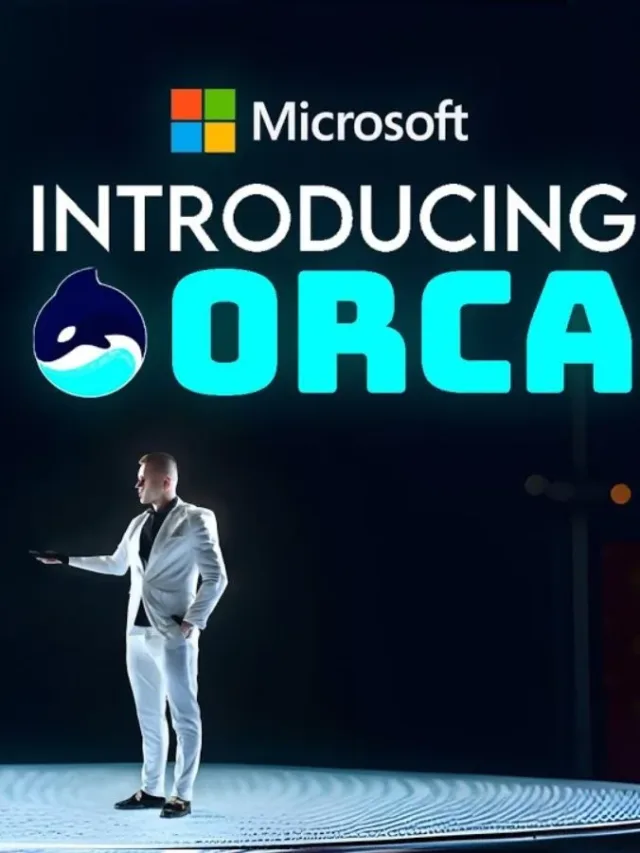Microsoft Orca AI, a model that learns by imitating the behaviours of sophisticated language models, as their most recent research project. In order to advance artificial intelligence, Microsoft has been at the forefront of incorporating AI capabilities into its goods and services. Microsoft works closely with OpenAI to achieve this goal. This ground-breaking model, created in collaboration with OpenAI, overcomes the shortcomings of smaller models and makes use of the strength of substantial language models like GPT-4. We shall examine Orca’s specifics, its capabilities, and any potential repercussions for the field of AI in this post.
Also Read: Microsoft Bing AI Introduces Voice Input on Desktop
Table of Contents
Limitations of Smaller Models Overcome with Microsoft Orca AI
Microsoft Orca AI is made to overcome the constraints normally present in smaller AI models. Orca surpasses the performance and capacities of conventional smaller models by replicating the thought processes present in larger fundamental models like GPT-4. This innovation enables researchers to run models individually and optimise them according to their unique requirements without requiring a lot of processing power.

Using Large Language Models for Customised
The flexibility of Microsoft Orca AI is to be fine-tuned and customised for certain tasks by utilising expansive language models like GPT-4 is one benefit of its reduced size. GPT-4 can impart its vast knowledge and talents to Orca, enabling it to acquire explanations, sophisticated cognitive processes, and intricate instructions step-by-step. Orca is optimised for particular use scenarios and performs at a high level because of this customised approach.
Progressive Learning with Microsoft Orca AI
Microsoft uses broad and varied imitation data to boost Orca’s progressive learning. Microsoft Orca AI can gradually improve their talents and skills by observing and emulating huge language models. Orca is able to take on more challenging tasks and continuously enhance its performance because of this iterative learning process.

Surpassing Vicuna and Achieving Milestones
By outperforming Vicuna, another AI model, by 100% on difficult zero-shot reasoning benchmarks like Big-Bench Hard (BBH), Microsoft Orca AI has already accomplished a huge milestone. This accomplishment demonstrates Orca’s excellent reasoning skills and its capability to surpass current models in challenging tasks. Additionally, when tested on AGIEval, Orca exhibits a stunning 42% boost in speed compared to traditional AI models, further demonstrating its usefulness and efficiency.
Orca’s Competitive Performance on Benchmarks
Microsoft Orca AI displays equal reasoning skills to ChatGPT on tests like BBH while being smaller. This shows that Orca is capable of reasoning and comprehension on par with more complex models. In addition, Orca exhibits competitive performance on academic standardised tests like the SAT, LSAT, GRE, and GMAT, even though it might not perform at the same level as GPT-4 in those particular tests. Because of its adaptability, Orca is a useful tool for many different applications.

Utilising Step-by-Step Explanations to Learn
Microsoft Orca AI can learn by using detailed explanations produced by both increasingly sophisticated language models and human specialists. This strategy enables Orca to learn and enhance its performance while offering insightful views into the expert reasoning process. Orca bridges the communication gap between professors and students by utilising thorough explanation traces, improving reasoning and comprehension abilities.
Advancements in Instruction-Tuned Models
An important development in AI has been made with the advent of Orca and its effective use in enhancing instruction-tuned models. Significant improvements in instruction-tuned models have come about as a result of Orca’s combination of step-by-step explanations, scaling tasks and instructions, and rigorous evaluation. This development enables student models to outperform current benchmarks and propel advancement in natural language processing by improving their capacity for reasoning and comprehension.

Future Prospects and Implications
Orca’s debut opens the door for additional AI study and advancement in the future. The potential for huge foundation models like Orca to independently supervise their behaviour or that of other models with minimum human interaction is enormous. Large foundation models may be fully utilised by researchers by improving the learning process and including complicated explanation trails, which will boost AI and natural language processing systems.
Conclusion
An important development in the field of AI is represented by Microsoft’s AI model, Orca, which was created in conjunction with OpenAI. Orca surpasses the limitations of smaller models and performs very well across a range of tasks by studying huge language models and modelling their behaviours. Its capacity to mimic and learn from complex language models like GPT-4 offers up new opportunities for customised AI models. Orca exhibits the potential to transform natural language processing and promote existing research in the field thanks to its competitive performance on benchmarks and continual development through progressive learning.
Disclaimer:
AI was used to conduct research and help write parts of the article. We primarily use the Gemini model developed by Google AI. While AI-assisted in creating this content, it was reviewed and edited by a human editor to ensure accuracy, clarity, and adherence to Google's webmaster guidelines.



